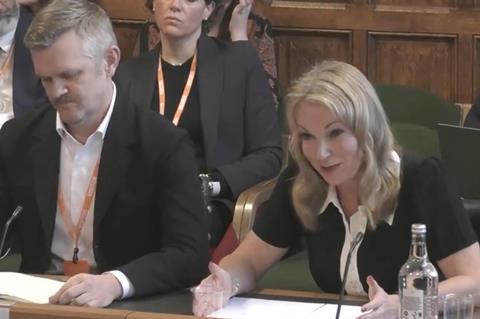
The UK’s culture, media and sport (CMS) committee has delivered its far-reaching recommendations to the government, following its in-depth inquiry into British film and high-end TV.
Key recommendations include extending the research and development (R&D) tax relief to support film development; introducing a 25% tax relief for the prints and advertising (P&A) costs of films claiming the Independent Film Tax Credit (IFTC); rejoining Creative Europe as an associate member; a 5% levy on streamers; and a better funded BFI to be able to fully deliver on its wide remit of responsibilities.
The inquiry was launched in 2023 and received submissions from 130 companies and industry bodies before moving to public evidence sessions in early 2024. Key figures to give evidence included the BFI’s CEO Ben Roberts and chair Jay Hunt, Studiocanal’s UK boss Alex Hamilton, Vue CEO Tim Richards, producers Jane Featherstone and Rebecca O’Brien, directors Gurinder Chadha and James Hawes, plus BBC Film and Film4 heads Eva Yates and Ollie Madden. After a general election-induced hiatus, a second iteration of the inquiry returned in the latter part of 2024 and early 2025. Conservative member of parliament Caroline Dinenage remained chair throughout.

The cross-party CMS committee scrutinises the spending, policies and administration of the government department for culture, media and sport and its connected bodies, including the BFI.
Creative Europe
The inquiry’s recommendations make a strong case for the UK to rejoin the European Union’s Creative Europe as an associate member. Before the UK left Creative Europe, Sixteen Films producer O’Brien secured £150,000 through its Media strand to develop five screenplays, a funding source that she said has not been replaced by the public service broadcasters (PSBs) or the BFI.
To soften the blow of exiting Creative Europe post-Brexit, the UK Global Screen Fund (UKGSF) was set up with backing from the department of culture, media and sport (DCMS) and administered by the BFI, to boost international development and distribution opportunities for the UK’s independent screen sector. It has around £7m a year to give out.
“The UK Global Screen Fund delivers excellent value for money, but is insufficient in level and scope to provide the support that our independent film sector requires,” said the inquiry’s report, recommending the government should increase the budget for the UKGSF and additionally, as part of the review of the implementation of UK-EU trade and co-operation agreement in 2026, seek to rejoin Creative Europe as an associate member.
Enhance development and financing support
To help support UK producers through the often lengthy and financially challenging development process, the report recommends the pre-existing research and development (R&D) tax relief be extended to support the film and high-end TV sectors and wider creative industries. The UK currently excludes the arts and humanities from eligibility for this relief, which is limited to science and technology, and is a measure supported by Directors UK and the British Screen Forum.
The report also asked the government to immediately review the impact of changes to the Enterprise Investment Scheme (EIS) and Seed Enterprise Investment Scheme (SEISS) on the film sector to ensure producers can and do access the full range of finance for their films, and report its findings to the committee within six months. Across 2017-18, the schemes introduced a ‘risk to capital’ test which undermined their accessibility for the independent film sector.
Cinema support
“A key issue is whether British films perform badly at the box office because cinemas do not screen them, or whether cinemas do not screen British films because they perform badly at the box office,” stated the report.
To help with the high marketing costs that prove a barrier for distributors and exhibitors in connecting lower-budget independent films with audiences, the report backed the Film Distributors Association’s call for a 25% tax relief for the P&A costs of films claiming the IFTC, to be introduced in the autumn 2025 budget.
Another recommendation is for the government to review the impact of a permanent cut to VAT on entry to cultural events, including cinema tickets, to identify whether it would support the growth of the creative industries. Cinemas received a temporary 5% rate during the pandemic and the exhibition community has been campaigning for a more permanent reduction – however, the inquiry acknowledges that a request for new reliefs must be considered within the context of the government receiving numerous requests from different sectors each year.
Streamers
The BFI is currently undertaking analysis of the impact of a streamer levy in the UK, to be published this summer, although it does not expect to make any recommendations.
The inquiry’s report recommends all subscription video-on-demand (SVoD) platforms that operate in the UK pay a 5% levy on their UK subscriber revenue into a cultural fund administered by the BFI to support domestic HETV production. The industry should establish this fund on a voluntary basis; however, if it does not do so within 12 months or if there is not full compliance, the recommendation is that the government should introduce a statutory levy.
Amid a lack of clear industry consensus on whether the public service broadcasters’ ‘terms of trade’ – which enable independent TV producers to retain their intellectual property rights – should apply to the US streamers, the report recommends the government immediately commissions research on how regulatory measures, akin to the terms of trade, could be applied to streaming platforms.
AI
The inquiry has clear actions for the government as the creative industries await the results of its consultation on how freely AI will be able to train on copyrighted works and what the guardrails will be for the tech sector, if any.
The report reiterated that the government should abandon its preference for a data mining exception for AI training with a rights reservation model and instead require AI developers to license any copyrighted works before using them to train their AI models.
Further calls to action for the government are for legislation to prevent historical contract waivers from being interpreted to allow the use of recorded performances by AI tools; for a review of the Copyright, Designs and Patents Act 1988 and the UK’s GDPR framework to consider whether further legislation is needed to prevent unlicensed use of data for AI purposes; and for the implementation of the Beijing Treaty, which protects intellectual property rights of performers in audiovisual performances, including extending unwaivable moral rights to audiovisual performances.

Boost for BFI
The BFI’s core grant-in-aid settlement from government has remained at the same level since 2011, amounting to around a 30% cut in real terms. With the BFI’s expanding remit, it requested in the inquiry for additional grant-in-aid and National Lottery ‘good cause’ funding, of which the BFI is one of five arts recipients.
One area in which it has struggled is the certification unit. Since 2011, the number of tax incentives administered by the BFI certification unit has increased from one (film) to six (film, independent film, HETV, video games, animation, children’s TV), with applications also increasing five-fold. However, that increased demand has not been reflected in an increase in grant-in-aid, resulting in a backlog of applications and an increase in turnaround times from four to six weeks to 18-20 weeks. Additional government support laid on during the inquiry brought this wait time down to 8-10 weeks; however, long-term additional funding is needed.
“There is a significant risk that studios will seek faster processes when considering where to make future productions especially as other countries are making large investments in production infrastructure to attract inward investment,” said the BFI in its written submission to the inquiry.
The report recommended that at each spending review, the government should ensure any recent or upcoming changes to the screen sector’s tax incentives, including but not limited to the addition of new forms of expenditure credit, are reflected in a commensurate increase in the grant-in-aid settlement for the BFI’s certification unit.
The inquiry also recommends the government conducts a review of how National Lottery returns for good causes are allocated between distributing bodies by the end of the 2025-26 financial year.
High-end TV tax credit
The Independent Film Tax Credit for UK-qualifying films under the £15m mark was formally introduced in October 2024. The IFTC offers an enhanced 53% credit, which equates to 40% in actual relief, while the standard Audio-Visual Expenditure Credit (AVEC) has a 34% headline rate, equating to 25.5% in actual relief.
The UK high-end TV sector, for which the standard AVEC applies, says it is facing challenges similar to those posed to independent film: difficulties securing budgets, declining revenues and rising costs. The commissioning budgets of the public service broadcasters have been squeezed by the real-term reduction of the BBC licence fee and a reduction in advertising revenue and cannot compete with the budgets of the streamers.
The report recommends the BFI urgently conducts analysis on the potential design and return on investment of a targeted uplift to HETV AVEC for domestic productions with budgets of £1m to £3m per hour, and suggests the government should commit to introducing the measure at the next fiscal event if the projected return on investment and impact on domestic production is found to be positive.
Across film and high-end TV, the report suggests that twice a year the government should benchmark the value and eligibility criteria of the UK’s film and HETV tax incentives against those of other countries. Where the UK’s offer is found to be less competitive, the government should immediately review the financial case for changing the UK’s incentives.
Regional incentives
The government should require productions claiming AVEC to report a breakdown of their spending across the nations and regions of the UK. This would improve data on the national and regional distribution of production spend and support the case for any policy interventions such as potential regional uplifts to AVEC.
Frustration concerning the perceived London-centric bias of the British Film Commission CEO and Film London CEO roles being held by one person, currently Adrian Wootton, should be addressed by the roles being split in two, the next time that the existing contracts are negotiated or the roles advertised.
Skills training and protections for freelancers
On the skills crisis, the report said the industry’s efforts “have been too slow and too fragmented to deliver the number of skilled workers needed. We lack confidence that the bodies tasked with tackling the problem will ever move beyond setting strategies, and finally deliver meaningful results.”
The inquiry was not impressed by national training body ScreenSkills’ October 2024 strategy, stating it lacked “clear objectives and measurable targets”. It recommends the government link any future public funding for ScreenSkills to specific, measurable outcomes based on the training body publishing and meeting ambitious and robust performance indicators.
ScreenSkills has argued it needs high-quality data in order to achieve its goals. The inquiry suggests the government introduces a statutory requirement for the entire film and HETV production industry to report their spending on skills and training as a percentage of their production budgets every financial year.
To support the precarious nature of freelance work, the report suggests the government should set out specific measures to address pay precarity among freelancers working across the creative industries, such as a guaranteed basic income or minimum hourly wage. Additionally, a freelancer commissioner should be appointed to work with the film and HETV industry to develop a framework for addressing pay precarity, hours, working conditions and behaviours that is published within 12 months of their appointment.
The UK’s Creative Industries Independent Standards Authority (CIISA) was set up to help protect a largely freelance creative workforce from bullying and harassment, with a unified framework of expected behaviours to run across the creative industries. CIISA still needs to lock in a long-term funding plan. CIISA is an industry-funded body, with Time’s Up UK, BBC, ITV, Channel 4, Channel 5 and Sky among its backers.
“All parts of the creative industries under CIISA’s remit should commit to unconditional, long-term funding within six months,” said the report. “In the meantime, the government should explore all options for funding CIISA in case the industry does not deliver a voluntary solution. If linking eligibility for Audio-Visual Expenditure Credits with support for CIISA is too complex and will potentially deter inward investment, industries under CIISA’s remit could be subject to a levy to fund its work.”

























No comments yet